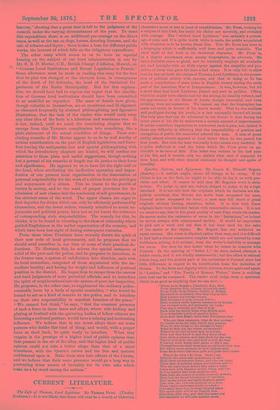CURRENT LITERATURE.
characters more or less in need of rehabilitation. Mr. Frost, looking for a subject of this kind, has made his choice not unwisely, and certainly with courage. The "wicked Lord Lyttleton" was certainly a person- age of note, and it is quite worth while to make the public acquainted with whatever is to be known about him. This Mr. Frost has done in a biography which is sufficiently well done and quite readable. The chief fault of the book is its rhetorical character. Mr. Frost is, in a degree uncommon even among biographers, an advocate. He has a doubtful cause to plead, and he naturally employs all available art, and inveighs with no little vigour against the stupidity and pre- judice of those who gave his hero a bad name. It is only fair to allow that he has set forth the claims of Thomas, Lord Lyttleton, to the posses- sion of political ability with success, and that in doing so he has made a contribution of some value to English history during the early part of the American War of Independence. It was, however, but for a short time that Lord Lyttleton played any part in politics. Office, which ho might have almost had for the asking, he steadily refused, and his appearances in the House of Lords, though successful, and even striking, were not numerous. We cannot say that the biographer has made out mach in favour of his hero's morals. That he was reckless and profligate during his youth, is a fact unhappily beyond all doubt The only plea that can be advanced in his favour is that during the latter years of his life he underwent a certain amount of improvement. It seems somewhat ungracious to controvert such a plea, nor, indeed is there any diffienity in allowing that the responsibility of position and occupation of public life somewhat sobered the man. A man of great ability almost always appears at least better when he has passed his first youth. But that the man was really better seems very doubtful. It is quite sufficient to read the letter which Mr. Frost gives on pp. 316-320 to be sure of this. This letter was written in the last year of his life, and it reveals only too plainly what sort of company he then kept, and with what cynical contempt he thought and spoke of morality.


































 Previous page
Previous page